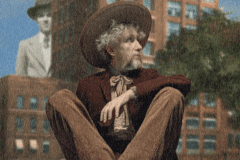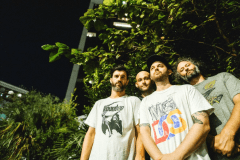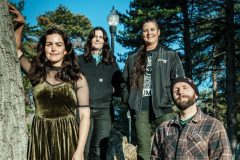Del Judas is the solo incarnation of Brooklyn musician Charlie Schmid, known for his work as drummer of bands like Tombs and Vaura. Stepping out from behind the kit for the first time, Schmid brings a lifetime’s worth of passion to these stellar songs – a dark, romantic, sinister sound that resides at the moonlit crossroads of country and post-punk, tipping the hat to Johnny Cash, Chris Isaak, Peter Murphy, and the films of David Lynch. Deity is a wondrous example of a metal musician successfully branching out to other genres and, context aside, the album stands on its own as an intensely atmospheric and memorable debut.
The vocals and instruments on Deity were recorded entirely by Schmid in his apartment in Brooklyn. The album was mixed by Evan McCulloch and mastered by Colin Marston (Jarboe, Sannhet, Kayo Dot) and released via Primal Architecture earlier this year.
Ghettoblaster chatted with Schmid about the endeavor.
Del Judas introduces a new persona for you as a singer, songwriter and multi-instrumentalist. How has this new persona manifested itself over the course of this project?
I’ve always written multiple kinds of music, and I grew up singing, but these songs in particular started to take shape when I was traveling throughout the West — Jackson Hole, Joshua Tree, across New Mexico — and melodies and themes that I wanted to sing started coming to me. As the songs developed I got more in touch with this genre of “Blackened Americana” that I’ve patched together. I often would keep my mind clear and let the music write itself, and some dark, swooning and romantic lines came out and I knew where I needed to go from there.
In the past you’ve been predominantly involved in heavy music projects. Deity is still dark, but also lush, romantic and owing a debt to both Americana and post-punk. What is it about these sounds that have intrigued you?
I’ve played in heavy projects because I feel think you can take more liberties and more freedom with that kind of music. It’s less restrictive. The same goes for the intersection between Americana and post-punk. Frankly, I wanted to make something that was the musical equivalent of an impressionist painting, lots of colors and textures, but ultimately as the listener you take something away that belongs only to you.
There is also some country influence here? What were your earliest and most lasting interactions with country music and how have those shaped you as a songwriter?
I’ve always loved country music. My mom used to sing Patsy Cline in the kitchen, my dad and I used to play songs by Travis Tritt, Johnny Cash and Doc Watson: me on drums and him on guitar. Music was the main staple of my household growing up. Everybody played an instrument. I sometimes like to stick to traditional forms at times in my songwriting and I can draw a lot from country there. Keep it simple stupid, you know? Leave a lot of space, let those ideas and sonorities breathe.
How about goth music?
I love plenty of goth music: Fields of the Nephilim, The Sisters of Mercy, Soft Kill. I dig the vibe, the style, and the dancing but I’m far too shy to go out to goth clubs so I just take long walks and listen to the music.
Deity plays with the concept that there is an association of kinship between the sex drive and the death drive, right? Can you explain that?
Entering and exiting sexual relationships is a process of birth and death unto itself. Obviously we all want to leave behind a legacy, but I believe time begs the question “why”? We all need to shed some skin and experience small deaths every day, but it’s painful. This record is about killing off versions of yourself that you may have been clinging to, things that no longer serve whoever you think you are. I’m a huge fan of the Joker; either The Fool in tarot or the villain from Batman. I feel his plight, every move we make as “adults” is a card dealt on the table of madness. So this record deals in that drive towards self-destruction and death, but also the sheer joy of the madness we experience every day fighting for something we’ll just ship off to a junk yard when we’re done with it.
I think we’ve all been in romantic relationships that ended and where we felt we’d lost or wasted a part of our life/soul. I imagine this has happened to you. In your opinion, is there hope for recovery, growth or rebirth?
All there is is growth, recovery, and rebirth. We’ll all be different in time, it’s inevitable.
What role did Evan McCulloch have in fine tuning the end product here?
Evan is a close friend of mine and we worked together to mix the record and put finishing touches on it. I think Evan’s background in mixing hip hop really helped shape the sound I wanted. He really worked tirelessly to get all the panning, reverb plates and textures together, he’s a real sculptor behind the board.
What are your proudest moments on the record?
The organ part for “The Desert Speaks.” I had to teach it to a friend of mine last month and I was so ecstatic with the shapes and the sonorities of each chord. The funny thing is I don’t remember writing it or playing it, maybe someone else played it? I don’t know, many strange things took place while creating these songs.
What are your loftiest aspirations for Del Judas?
Well, I’ve spent the first 25+ years of my life in the service of some amazing bands and musicians as a drummer. Now I hope to carry out the rest of my life singing and playing to my audience while at the same time continuing on as a drummer and percussionist. I’ve always played music and I always will, it’s truly a blessing to have an opportunity to be a professional artist.
Bandcamp







Social Media